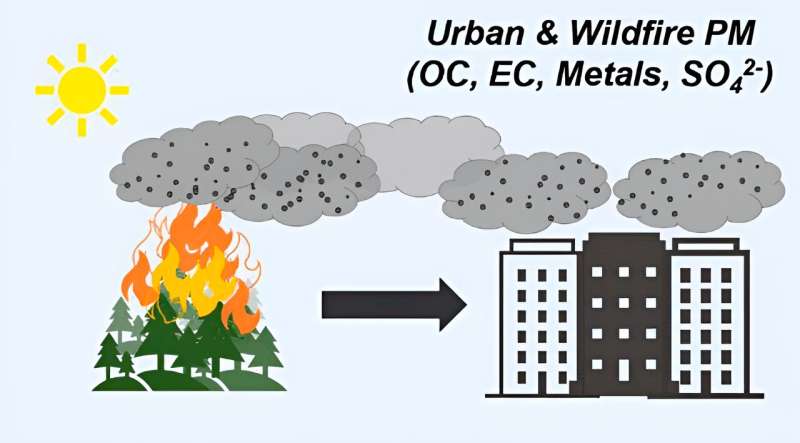This article has been reviewed according to Science X's editorial process and policies. Editors have highlighted the following attributes while ensuring the content's credibility:
fact-checked
trusted source
proofread
Wildfires in Ontario and Manitoba affect air quality in Montreal, study shows

In July and August 2021, smoke from wildfires in northwestern Ontario and Manitoba affected air quality in Montreal, according to a study led by Patrick Hayes, a professor in the Department of Chemistry at Université de Montréal, and published in ACS Earth and Space Chemistry.
Although they were thousands of kilometers away, the fires caused significant increases in PM10, tiny particles that are harmful to respiratory and cardiovascular health. On days when Montreal's air quality was affected by smoke from the wildfires, PM10 concentrations were about twice as high as on other days.
Biomass burning produces smoke composed of a complex mixture of gases and particles, including carbon monoxide, nitrogen oxides, ozone and polycyclic aromatic hydrocarbons (PAHs), all airborne contaminants with adverse effects on human health.
Concerns for the future
After analyzing the chemical composition of suspended particulate matter in Montreal air, Hayes and his team assessed its toxicity using a laboratory test to estimate the oxidative stress caused by the particles in the lungs. The researchers were surprised to find that background urban pollution and particles from forest fires had similar toxicity.
"This means that breathing 1,000 particles of fire smoke or 1,000 particles of urban pollution has similar health effects," Hayes commented. "The risk becomes greater when there is smoke from wildfires but only because particle concentrations increase, not because these particles are more harmful; during smoky periods, the impact on air quality comes from the wildfires, not from urban pollution sources."
Hayes believes this is cause for concern. Due to the climate crisis, the intensity and frequency of forest fires will increase, and air quality in densely populated urban areas will suffer.
"With climate change, wildfires are expected to spread northward into the boreal forests, which are less accessible and where the fires are harder to fight," he said. "This is worrisome, especially since smoke from fires in eastern Canada tends to stay close to the ground and will therefore affect air quality in Quebec, whereas the smoke from fires in western Canada disperses to some extent before it reaches Quebec."
More information: Nicole Trieu et al, Impacts of the 2021 Northwestern Ontario and Manitoba Wildfires on the Chemical Composition and Oxidative Potential of Airborne Particulate Matter in Montréal, Canada, ACS Earth and Space Chemistry (2024). DOI: 10.1021/acsearthspacechem.3c00319
Provided by University of Montreal



















